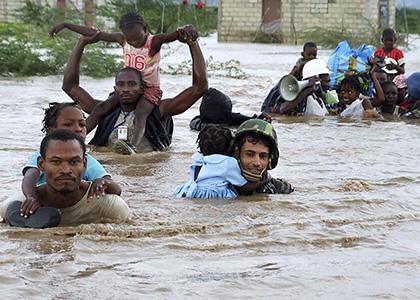As the world creeps closer to global temperatures surpassing a limit agreed to in the Paris climate accords, 16 high-level leaders — aided by UCLA-led research — have formed a commission to consider responses that would minimize risks to people and the planet.
The Global Commission on Governing Risks from Climate Overshoot will evaluate potential responses to the increasingly likely risk that climate change will exceed the Paris target of holding global heating to 1.5 degrees Celsius above pre-industrial levels.
“The effects of climate change are already upon us and more severe impacts are coming. It is essential to begin planning for the stronger policy and technology responses needed to limit overshoot of the 1.5 degree C target and manage the devastating impacts that could follow such overshoot,” says Ted Parson, the Dan and Rae Emmett Professor of Environmental Law at UCLA School of Law. “The commission brings together a truly global set of wise expert perspectives to consider the whole range of options.”
Parson, who is faculty director of the Emmett Institute on Climate Change and the Environment, leads a world-leading research initiative for the study of legal and policy issues presented by technologies like solar geoengineering and carbon dioxide removal.
The commission will consider potential responses to supplement accelerated emissions cuts under conditions of severe climate change. These include more-comprehensive approaches to climate adaptation, large-scale removal of carbon dioxide or other greenhouse gases from the atmosphere, and technologies to reflect incoming sunlight and cool the planet. With adequate governance and in coordination with emissions cuts, such initiatives could help manage the risks of climate change.
Research and public engagement by UCLA faculty and fellows has been integral to the conception and development of the commission, starting with a policy paper Parson published five years ago that first proposed a commission on the related issue of governance of solar geoengineering. Parson later served on a steering committee considering the need for a robust public dialogue around climate responses. Adrien Abécassis, then a fellow at UCLA Law, mediated the committee, which ultimately suggested a commission.
The commission’s members include four former presidents and prime ministers, six national ministers, and senior international officials and leaders of environmental organizations, with the majority from the global south. Pascal Lamy, former director-general of the World Trade Organization, will co-chair the commission. The Paris Peace Forum, a non-profit focused on global problems, is the initial host of the commission’s secretariat.
Parson will serve as senior advisor to the commission. Abécassis is principal of the commission and special advisor to its co-chair. And Jesse Reynolds, a UCLA Law fellow from 2018 to 2021, is executive secretary of the commission’s secretariat.
The commission’s goal is to deliver an integrated strategy of climate responses, including the laws and policies to govern them, by late summer 2023, when international leaders will gather for annual United Nations climate talks. To achieve this objective, the commission will gather input from leaders of civil society organizations and youth movements, as well as leading scientists.
“The commission will be looking for policy options that reduce climate risks and are based on sound evidence,” Parson says. “The research process will reflect the global nature of this problem, with an emphasis on responses that are just and equitable for those communities most exposed to the risks associated with rising temperatures.”
Parson’s research initiative on geoengineering governance is one of several international climate projects at the UCLA Emmett Institute. Professor Alex Wang leads a California-China research collaboration considering emissions trading programs and other climate policy questions. And William Boyd, also a professor of law at UCLA, serves as project lead for the Governors’ Climate and Forests Task Force, a major coalition of sub-national governments focused on protecting tropical forests and promoting sustainable rural economies. Both Wang and Boyd are faculty co-directors of the Emmett Institute. UCLA Law was recently ranked as No. 1 for environmental law by U.S. News & World Report.
